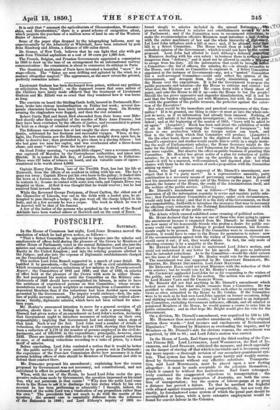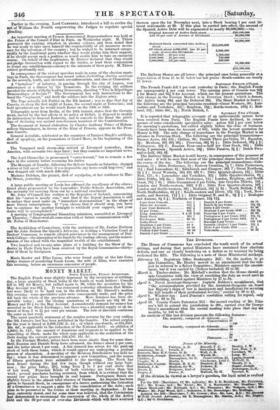POSTSCRIPT.
In the House of Commons last night, Lord Josef litreaatz moved the resolution of which he had given notice as follows-
" That a Select Committee be appointed to inquire into the salaries and emoluments of offices held during the pleasure of the Crown by Members of either House of Parliament, voted in the annual Estimates; and also into the salaries and emoluments of judicial officers in the Superior Courts of Law and Equity in the United Kingdom ; and into the retiring pensions allotted to the Judges; and also into the expense of Diplomatic establishments charged on the Consolidated Fund."
This motion Lord John Russell supported in a speech of some detail. He juetified it by precedents,—the Committee of 1798 on civil establishments, which recommended various reductions of law salaries in its Twenty-seventh .Report; the Committees of 1818 and 1828; and that of 1830, on salaries of office held at the pleasure of the Crown with scats in either House. He had postponed his motion until the Committee on the Military esta- blishments of 1848 should have accomplished its labours, in order to have the assistance of experienced persons on that Committee; whose recom- -mendations would be much weightier as emanating from a Committee of in- dependent Members than if the reductions had been decided upon reasons' presented by the Government. The inquiry would embrace—first, the sala- ries of pubhc servants; secondly, judicial salaries, especially retired allow- ances; thirdly, diplomatic salaries, which have not been revised for nine- teen years. Mr. Henley's announced intention to move for a general revision of all salaries; shows there is a feeling in favour of such a proceeding. Mr. Disraeli had given notice of an amendment on Lord John's motion, declaring that Government ought to introduce measures of reduction on their own responsibility; implying that Government had not already taken steps of that kind. Such Is not the fact. Lord John read a number of details of reductions, the comparison. going as far back as 1798, showing. that there has been a reduction of 2,170 in the number of persons employed in the civil de- partments, and of 259,650/. in the expenditure ; principally, however, since 1833. There are insuperable difficulties in the way of any general reduction at once, or of making reductions according to a ratio of prices, by a fixed tariff of salaries.
Before concluding, Lord John combated a notion that it would be better for the public service if it were carried on by persons not in Parliament : the experience of the Poor-law Commission shows how necessary it is that persons holding offices of state should be Members of Parliament and able to defend their conduct there.
Mr DISRAELI proposed his amendment ; explaining how the course proposed by Government was not necessary, not constitutional, and not calculated to effect its professed object. When' with the rest of the House, he heard Lord John recite the pro- gressive reductions made by Government, the question impressed on his mind was, why not persevere in that course ? "Why does the noble Lord come down to the House to ask it to discharge for him duties which by his own account he has been performing so admirably ? I thought, indeed, the statement of the noble Lord was a vindication of my proposition rather than Ins own." The precedents had not much to do with the merits of the -question ; the present case is essentially different from the reference of the Estimates in 1848; and Lord Althorp's inquiry of 1831 re- ferred simply to salaries included in the annual Estim (- present motion referred to salaries and establishments sec of Parliament ; and if the Committee were to recommend retl!lc make the recommendation effective Ministers must introduce a, '- -
with the entire machinery of law and the whole hierarchy 10114* bill a Select Committee. House would then at
Let Lord John intr-Rduce such a bill at once; and, if he pl
to embodied opinion of the Government ; which it would not have proposed. Lord John had alluded to Lord Althorp's deli=
a Ministers dealing with his own salary : in business there is no "4.1... dangerous than ” delicacy," and it must not be allowed to enable a •. to escape from his duty. All the information that could be brou ":1"":11' a Committee the list of officers, the saltine!, &c.—is already accessible to the House, and it needs no Committee to expiscate it. A Select Committee appointed at the instance of Government—say, not a "packed " Committee but a well-arranged Committee—could only reflect the opinion of the Government, and derogate from the yearly diminishing control of the House over the expenditure. It is for the Government to propose the public payments and taxation—for the House to criticize and control : but what does the Minister now ask ? He comes down with a blank sheet of paper, and asks the House to fill it up—asks the House to tax the people ! Should the tax prove oppressive and engender dissatisfaction, will it not be said that the burden originated, not with Ministers, but with the Commons —with the guardian of the public treasure, the protector against the extor- tion of the Executive?
But what would be the immediate and practical consequence of this Com- mittee? If it be granted, one thing is clear—it must go into the whole sub- ject de novo, as if no information had already been amassed. Nothing, of course, will satisfy it but thorough investigation ; its evidence will be pub- lished; and at the beginning of the session of 1111, "leave will be asked to sit again." (Laughter.) Much has been said about the exhibition of works of art in 1851—much respecting the "competition of foreigners " ; but there is one production which no foreign nation can touch, and that is the blue book which that Committee will produce. (Laughter.) On the other hand, there cannot be the slightest doubt that Lord John Russell's experience and studies would enable him to settle in a single morn- ing the scale of Parliamentary salaries ; the Home Secretary: might do the same for the Judicial salaries ; Lord Palmerston for the Foreign salaries—no one more capable. But observe the effect on public business of granting this Committee. Mr. Henley has given notice of a plan for reduction of public salaries ; he is not a man to take up the question in an idle or trifling mood—it will be a matured, well-considered, and digested plan : but what chance will there be for the success of such a proposition with the Committee sitting upw u, pstairsho 1L1 expressed approval of Mr. Disraeli's amendment, now object that it is "a party move." In a representative assembly, party combination is a necessary means of preventing corruption; but in point of fact his amendment arose strictly out of the Notices on the paper. It would sustain the honour of the House, the credit of the Administration itself, and the welfare of the public service. (Cheers) Mr. Disraeli's amendment ran as follows—" That this House is ill possession of all the information requisite to revise and regulate public sala- ries; that Parliamentary Committees of inquiry, under such circumstances, would only lead to delay ; and that it is the duty of the Government, on their own responsibility, forthwith to introduce the measures that may be necessary for effecting every reduction in the National Establishments consistent with the efficient discharge of the public service."
The debate which ensued exhibited some crossing of political action.
Mr. HUME declared that he was not one of those who were going to oppose the amendment because it emanated from Mr. Disraeli : he should like to see how many of his honourable friends who profess a desire for public eco- nomy could vote against it. Perhaps it pressed Government, but Govern- ments ought to be pressed. Even if the Committee were to recommend re- duction, it would have to come to the House for permission to reduce : now if the recommendation agreed with the wishes of Government, Government would carry it out; if not, they would abstain. In fact, the only mode of effecting economy is by a majority in the House. Mr. HENLEY had been at a loss to understand Lord John's motion, and eould not understand it any better for his speech. He gave no indication that he intended reductions. As to the Committee—would the child unborn see the issue of that inquiry ? Mr. Henley would vote for the amendment. The amendment was also supported by Mr. GI/tamer Beaseinr, Mr. Hermits, Mr. HENRY DRUMMOND. Lord JOHN MANNERS. Sir BENJAMIN HALL could not trust Ministers with the reduction of their own salaries ; but he would vote for Mr. Henley's motion. Mr. Commis; applauded Lord John for so far responding to the wishes of the public and would vote for his motion. The motion was also supported by Lord MARRY VANE and Sir CHARLES WOOD. Mr. BRIGHT did not find anything in Mr. Disraeli's amendment which looked more real than what might emanate from a Committee. He was gratified to observe both parties vying with each other in carrying out the views so often submitted to the House by Mr. Cobden. If the Committee were to be such as he had seen Lord John appoint on former occasions, delay and shirking would be the only results; but if he consented to an independ- ent Committee, excluding Government influence, officials, and all salaned or pensioned Members of the House, he would pursue a course to raise him in public estimation ; and in that hope Mr. Bright would give his vote for the Government.
On a division, Mr. Disraeli's amendment, was negatived by 250 to 159. Mr. Homasiew then moved another amendment, adding to the original motion these words—" And incomes and emoluments of Ecclesiastical Dignitaries." Resisted by Ministers as overloading the inquiry, and by Members on Mr. Disraeli's side for obvious reasons, the amendment was negatived, by 208 to 95; and Lord John's motion was carried.
In the House of Lords, Earl GREY moved the third reading of the Con- vict Prisons Bill. Lord Lvrrm.rost, Lord WODEHOUSE, the Earl of IL. CHESTER, and Lord STANLEY criticized the measure, and dwelt especially on the danger of staving off that which is inevitable and is becoming every day more urgent—a thorough revision of our secondary-punishment sys- tem. That system has been in many parts hastily and weakly surren- dered by Government without any effective substitute. Transporta- tion, said Lord MONTEAGLE, must be placed upon a new footing altogether : it must be made acceptable to the colonists themselves ; which it eennot be without free institutions. Earl Garr retrospect- ively combated the exaggerated objections to transportation : the prosperity, nay the free emigration of Australia, are both the crea- tion of transportation; but the system of labour-gangs at so great a distance has proved a failure. To that he ascribed the frightful evils alleged against transportation ; and prospectively, but not very dis- tinctly', he foreshadowed some system of which the penal part should be accomplished at home, while a more extensive employment would be found for convict-labour in the Colonies.
Earlier in the evening, Lord Caatemzra. introduced a bill to revive the Sot of William the Fourth empowering the Judges to regulate special pleading.



























 Previous page
Previous page